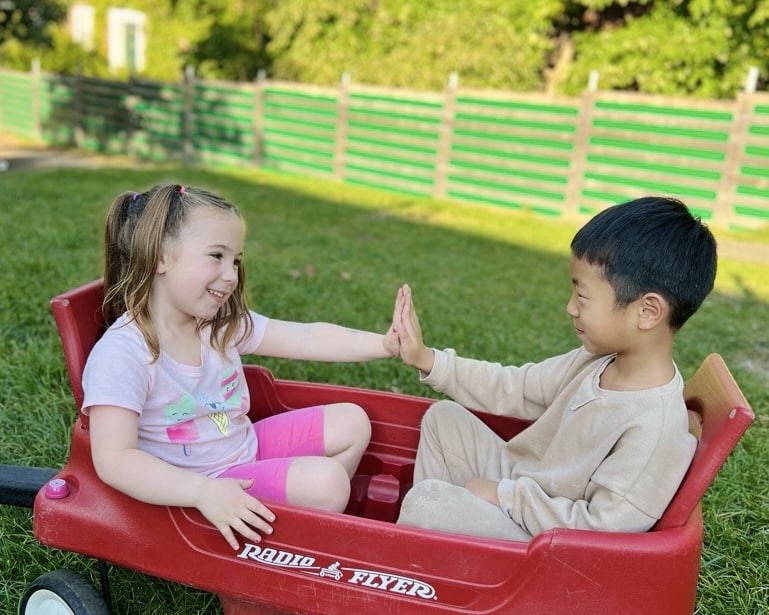“All children are good inside. All children are kind. All children deserve to be loved.”
What You’ll Learn
- What is prosocial behavior and how does this benefit my child?
- How do I encourage my child to be kind and generous?
- What are some ways we can practice this behavior at home?
All children are good inside—thank you, Dr. Becky, for this phrase! I choose to believe this and I get to witness it every day, sometimes in the most simple ways. A child screaming “bless you” from across the room after hearing their friend sneeze or two children sharing a bicycle when there are none left at the playground. All children are good inside. All children are kind. All children deserve to be loved.
Remember though, that your child is human and sometimes our actions don’t always align with who we truly are inside. Being kind and generous isn’t always easy, but we can encourage children to choose these behaviors, and here’s how you can do so.
The Benefits of Raising a Kind Human
Prosocial behavior is intentional behavior, including kindness and generosity, that benefits others. These behaviors are linked to one’s social and emotional health, directly effecting other areas of development and learning. Teaching and encouraging prosocial skills helps children thrive. Kindness, in particular, is a virtue and value that brings peace and harmony, contributes to happiness, and leads to less stress and better well-being.
Encouraging Kindness and Generosity
While kindness is not understood by young children at the same level as it is by adults, it is never too early to encourage your child to practice kindness. Doing so will only help them understand the value of this behavior and eventually practice it independently. You can start by talking about the concepts of kindness and generosity, and how this makes people feel. Books are an effective way to introduce or teach a new concept to children. Here are my recommendations:
- Be Kind by Pat Zietlow Miller
- The Rabbit Listened by Cori Doerrfeld
- Last Stop on Market Street by Matt de la Peña
- Kindness Grows by Britta Teckentrup
- The More You Give by Marcy Campbell
- The Nice Book by David Ezra Stein
- Counting Kindness: Ten Ways to Welcome Refugee Children by Hollis Kurman
- Tomorrow I’ll Be Kind by Jessica Hische
- My Heart by Corinna Luyken
- What Does It Mean to Be Kind by Rana DiOrio
Another way to encourage any type of behavior we want children to practice is by modeling it ourselves. Children mimic what they see the adults in their lives doing. Include your child in your acts of kindness and remember to show kindness and generosity towards your child, like playing their favorite game, so they know what it feels like to be on the receiving end of generosity.
Make it a choice. Forcing children to be kind or generous is not effective in the long run—we want children to feel intrinsically motivated to practice kindness and generosity. Provide guidance, but let your child act voluntarily when suggesting an act of kindness.
Powerful Acts of Kindness
Here are 10 powerful acts of kindness you can do with your child!
1. Make a card to let someone know you love them.
2. Set up an empty box and label it “Giving Back.” As a family, fill this box with items you no longer need and take a trip to donate the items to other people in need.
3. Make kindness rocks and scatter them throughout your community for people to find.
4. Ask a friend or family member what you can do to help them.
5. Go to your local park and collect litter to put in the garbage.
6. Greet those working at the post office, grocery store, or anywhere you frequent as a family. Remember to also say thank you!
7. Cook or bake something to deliver to a neighbor.
8. Tell someone why they are special to you and the world.
9. Find a charity that is meaningful to your child and donate your time or financially.
10. Ask someone if they need a hug.
Empowering Takeaways
- All children are good inside and are capable of kindness and generosity.
- Children have to experience kindness and generosity to show it to others independently.
- Small, powerful acts of kindness can go a long way, and children can be part of this!
Be vibrant and keep thriving!
This article was last reviewed or updated on December 22, 2023.
References
Caputi, M., Lecce, S., Pagnin, A., & Banerjee, R. (2012). Longitudinal effects of theory of mind on later peer relations: The role of prosocial behavior. Developmental Psychology, 48, 257-270.
Child Mind Institute. (2023). Tips for Raising Generous Children. https://childmind.org/article/tips-for-raising-generous-children/
Baldwin, C. P., & Baldwin, A. L. (1970). Children’s Judgments of Kindness. Child Development, 29. doi:10.2307/1127387
Malti, T. (2020). Kindness: A perspective from developmental psychology. European Journal of Developmental Psychology, 629-657. doi:10.1080/17405629.2020.1837617
Malti, T., Dys, S. P. (2018). From being nice to being kind: Development of prosocial behaviors. Current Opinion in Psychology, 45-49. doi:10.1016/j.copsyc.2017.07.036
Morin, A. (2022). 7 Random Acts of Kindness for Kids. Verywell Family. https://www.verywellfamily.com/random-acts-of-kindness-for-kids-4136440



